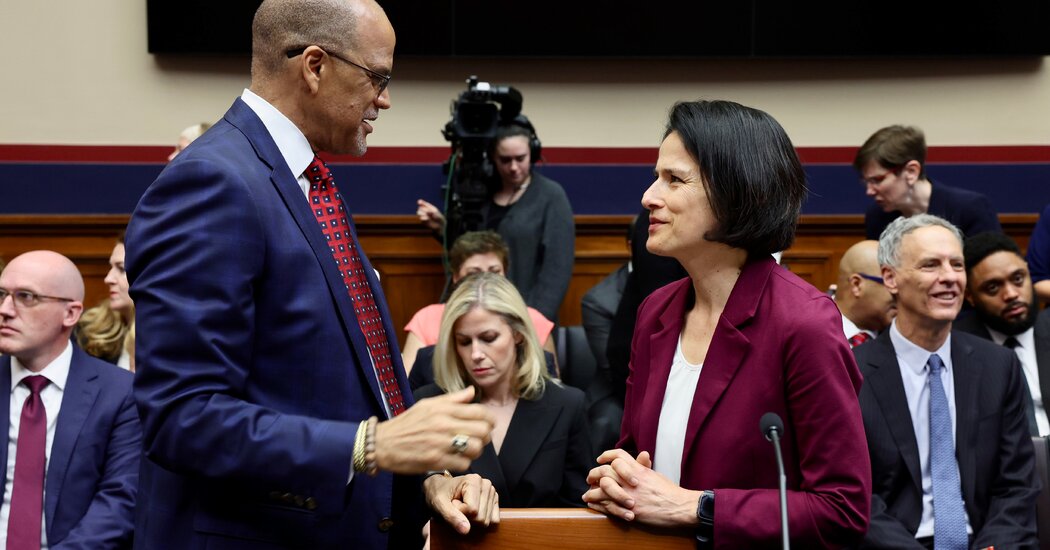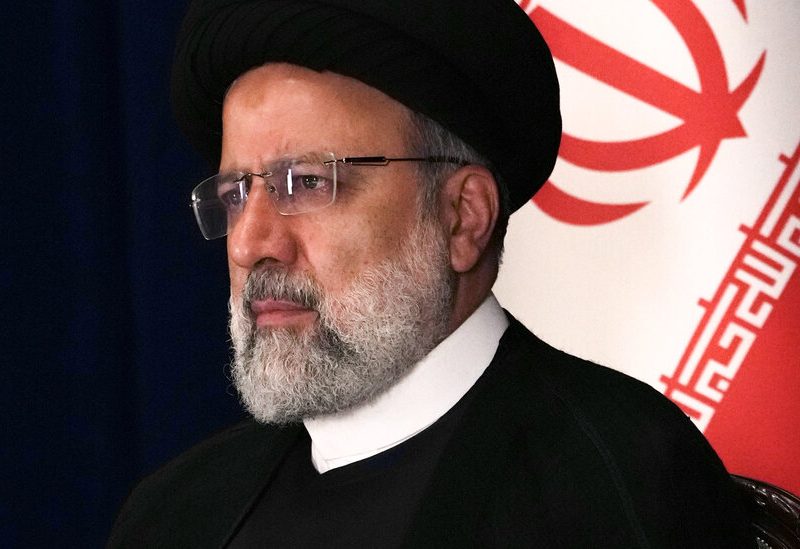The House of Representatives is one of Washington’s most raucous forums, a free-for-all of personalities with profiles to raise and points to score.
But it turns out that the rough-and-tumble of steering a public school district — board sessions, P.T.A. meetings, battles over textbooks and discipline — may be sound preparation for the rough-and-tumble of testifying before the House. As public school leaders showed on Wednesday, mixing it up a bit can go far toward neutralizing a Congress with a craving for the spotlight.
Wednesday’s hearing was the latest in the House Committee on Education and the Workforce’s effort to scrutinize antisemitism on campuses and, along the way, castigate academic leaders. At earlier hearings, university presidents opted for strategies of conciliatory genuflection or drab, lawyerly answers. Both approaches largely backfired, stirring outrage on those presidents’ campuses and often beyond.
Both approaches were largely discarded on Wednesday.
“This convening, for too many people across America in education, feels like the ultimate gotcha moment,” David C. Banks, the New York City schools chancellor, said toward the hearing’s end. “It doesn’t sound like people who are actually trying to solve for something that I believe we should be doing everything we can to solve for.”
By then during the two-hour, Republican-led proceeding, Mr. Banks had seemingly put his law degree to use. He had pointedly debunked some claims: “We have found no evidence that that actually happened.” He acerbically dismissed a lawmaker’s pronouncement: “I’m sorry you feel that way.” And he suggested that maybe Congress was not always as pure as proclaimed: “We’ve had members of Congress who have made antisemitic statements.”
Down the witness table, Enikia Ford Morthel, the schools superintendent in Berkeley, Calif., corrected a congressman from her home state, seemed unbothered by the members’ pressure to discuss personnel matters in a way that would defy California law on employee confidentiality, and all but diagramed a rambling question about discipline she said had left her “confused.”
The tactics represented a sharp departure from the norms of Capitol Hill, where legislators generally handle the browbeating during made-for-television hearings.
There are exceptions. Last year, Senator Markwayne Mullin, Republican of Oklahoma, invited the president of the International Brotherhood of Teamsters to “stand your butt up” and fight. The union leader, Sean O’Brien, threw back the same dare. It fell to Senator Bernie Sanders, at 82, to rap his gavel and prevent a Senate hearing from including literal fisticuffs.
But in two House education committee hearings, university leaders had been solicitous of Congress, or at least stoic. Wednesday’s hearing was the first time during this particular inquest that witnesses so consistently challenged their interrogators.
Christopher Armstrong, a lawyer with Holland & Knight who represents clients through congressional investigations and oversight hearings, said he did not generally encourage combativeness before Congress.
“I can’t imagine a situation where it helps you,” he said, though he conceded that Wednesday’s hearing had perhaps proved just such a situation.
Indeed, Mr. Banks, who became chancellor in 2022, sounded much like a pleased, grizzled New Yorker after the hearing. Like the other leaders testifying with him, he had been tested by ferocious debates on unforgiving stages. To him, Capitol Hill was just another.
“The complexity of New York City prepares you for moments like this,” he said, surrounded by New York faith leaders who had traveled with him to Washington. “And I think maybe some of the university presidents did not have the benefit of this kind of inspection, if you will.”
That may be true. But local schools superintendents also have far different mandates from presidents of major universities. Superintendents only rarely command national profiles, with their most important audiences practically in their backyards. Presidents of universities like Columbia and Harvard must contend with sprawling networks that routinely include emboldened faculty members, wealthy donors, powerful trustees and undaunted students.
“That’s a much harder balancing act than the chancellor of the New York City public school system has,” said Mr. Armstrong, who felt Mr. Banks’s method would be inappropriate for a college president.
The local school leaders had other advantages. Americans are deeply accustomed to a national soundtrack of frustrations with public education, noted Ira Stoll, a former managing editor of a Harvard-based education policy journal. But they also have shown a limited appetite for federal oversight of the nation’s elementary and secondary schools.
The elementary and secondary education system is largely locally controlled and locally funded. Although the federal government oversees civil rights complaints in schools, that is usually handled by the Education Department through an investigative process — not by Congress.
Gov. Ron DeSantis of Florida and groups like Moms For Liberty have demonstrated that public schools can be ripe for political battle. But Republicans in Congress, who have been eager to recapture the power of the December hearing that helped precipitate the resignations of the presidents of Harvard and the University of Pennsylvania, also have a refined strategy for attacking higher education as a bastion of out-of-touch elites.
“There was a book, ‘Harvard Hates America,’” said Bill Kristol, the prominent conservative writer, referring to a conservative exposé from the 1970s on the elitism and liberal indoctrination on display at Harvard. “There’s no book, ‘Fairfax County Public Schools Hate America.’”
Lawmakers did not always help themselves on Wednesday. They often meandered during their five-minute allotments for questions, keeping the proceedings unfocused as witnesses waited out the clock, all too happy to let them ruminate.
Republicans did manage a few triumphant moments. Under questioning from Representative Virginia Foxx, Republican of North Carolina, Ms. Ford Morthel acknowledged that parts of a Berkeley lesson on the Israel-Hamas war seemed to minimize the impact of the conflict on Israelis.
Representative Kevin Kiley, Republican of California, also proved effective when he asked questions about the district’s ethnic studies curriculum.
Ms. Ford Morthel acknowledged that her district was working with a group known as Liberated Ethnic Studies, which offers sample curriculum materials that are highly critical of Israel — in defiance of California guidelines on how the subject should be taught.
Overall, though, “I thought that the questions were not sharp,” said Lori Lowenthal Marcus, legal director of the Deborah Project, a group that has sued several California school districts, including Berkeley, for what it considers antisemitic bias in curriculum materials about Israel. “I thought that the people testifying were able to slide away.”
Representative Aaron Bean, the Florida Republican who led the hearing, declared that it had “been an excellent meeting” with “an open and honest conversation.”
“Our objectives were shining the light that this is indeed happening,” he said of reports of antisemitism in schools. “A lot of folks say it’s not happening.”
Republicans will have another chance to make their point on May 23, when the presidents of three universities — Northwestern, Rutgers and the University of California, Los Angeles — are expected on Capitol Hill.
Whether Republicans can realize their ambitions may well hinge on which playbook those presidents use.


